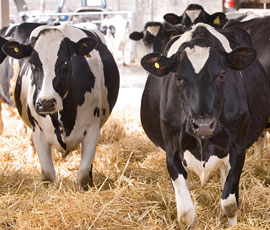Engage with animal protestors to win battles

Farmers should be more open and honest about the way they produce food if they want to win over animal rights campaigners and protest groups.
Richard Perkins, senior commodities advisor for campaign group the World Wildlife Fund, said farmers needed to open dialogue with groups like Compassion in World Farming and Green Peace if they were going to dispel the myths surrounding agriculture.
Speaking at the Dairy UK conference in Birmingham on Monday (5 September), Mr Perkins said farmers needed to be more open about the fact they were primarily businesses, but also provide evidence that showed their production practices benefitted livestock and the environment.
“If you can sustain a dialogue with non-government organisations, it will be more productive,” he told delegates. “You need to understand their views, even if you don’t like them.
“There’s a lot in agriculture which makes people say ‘yuk’ and it’s that fear and lack of understanding that NGOs can tap into. While people feel disconnected from food systems and don’t know what’s going on these organisations will play on that.
“Say what you are, be authentic and honest. If you are evidence based and can report measurable achievements that’s great.
“Showing that you are doing good things other than maximising your returns is a far more convincing argument when you engage with NGOs.”
Mr Perkins said agriculture needed to resolve its conflict between portraying a pastoral image and one where economics was driving farmers’ interests if it was to successfully engage in debate with activists.
“There are fundamental conflicts between the way the industry is presenting food as a natural product and the way the industry is moving to use clever scientific innovation which makes the industry more streamlined. It’s a key challenge the industry faces,” he said.
For dairy farmers, the challenge was to find a place for dairy in UK consumers’ diets, given that government targets were to cut greenhouse gas emissions by 70% by 2030 – something many pressure groups have argued could be achieved by cutting livestock numbers and meat and dairy consumption.
“WWF has said dairy consumption should stay at 15% of people’s diets,” Mr Perkins said. “But there’s a real difference between measured views of NGOs like WWF and the dairy industry’s aspirations to increase dairy consumption.
“We are trying to engage in dialogue and do research but it will be a real challenge to be able to reconcile those differences.”
Examples of diverse NGO views on the dairy sector
• Commonly held view that going organic will solve dairy’s long term problems
• “Abolish the Holstein” – a view expressed by Joyce de Silva, Compassion in World Farming
• “Pay farmers enough” – a view from ex dairy farmer Peter Lundgren
• “Milk is full of pus, don’t drink it” – a Vegan Society pamphlet
• “Make dairy 15% of UK food consumption by 2020”
• “Eat more plant based foods”
